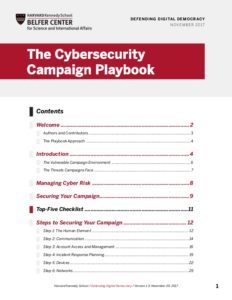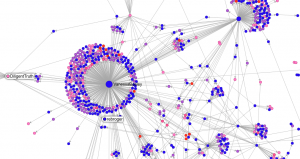
.
Last week’s elections in the Indian state of Karnataka caught the world’s attention as headlines called out the prodigious use and misuse of WhatsApp messaging. But it is not the first time private messaging platforms like WhatsApp or Facebook Messenger have stood accused of enabling disinformation, “fake news,” and, sometimes, violent clashes in already-polarized societies, notes Kate Musgrave of the National Endowment for Democracy’s Center for International Media Assistance:
[E]ven if fact-checkers had the bandwidth to cover innumerable private groups and constant rumor, once the questionable message has reached them, it has already passed through too many (untraceable) hands to count. The best response, then, might be the one we’ve pushed all along—as one panelist remarked at the recent PeaceTech Summit, “the solution to hate speech is not less speech, it’s more speech.” The solution to disinformation and “fake news” is not cutting off all information, but rather better supporting trustworthy, independent information.
 Cybersecurity threats pose an increasingly serious risk to political campaigns, with the potential to undermine the democratic process and faith in democracy itself, the International Republican Institute reports. In an effort to share best practices with European partners ahead of the 2019 EU elections, IRI and the National Democratic Institute (NDI)* partnered with Defending Digital Democracy (D3P)—a project of the Harvard Kennedy School’s Belfer Center—to adapt the Center’s Cybersecurity Campaign Playbook for a European audience. “The Cybersecurity Campaign Playbook: European Edition” represents the insights of a bipartisan group of leading policy, campaign and cybersecurity experts.
Cybersecurity threats pose an increasingly serious risk to political campaigns, with the potential to undermine the democratic process and faith in democracy itself, the International Republican Institute reports. In an effort to share best practices with European partners ahead of the 2019 EU elections, IRI and the National Democratic Institute (NDI)* partnered with Defending Digital Democracy (D3P)—a project of the Harvard Kennedy School’s Belfer Center—to adapt the Center’s Cybersecurity Campaign Playbook for a European audience. “The Cybersecurity Campaign Playbook: European Edition” represents the insights of a bipartisan group of leading policy, campaign and cybersecurity experts.
IRI also collaborated with NDI and D3P to create an international edition of the “Election Cyber Incident Communications Plan Template.” This template provides easily-adaptable guidance to enable political parties, campaigns and other stakeholders to communicate quickly and effectively in the event of a cybersecurity incident in order to maintain confidence in the democratic electoral system. Read more about the Defending Digital Democracy project here.
 The Atlantic Council’s Digital Forensic Research Lab is partnering with Facebook to expand its #ElectionWatch program to identify, expose, and explain disinformation during elections around the world. The effort is part of a broader initiative to provide independent and credible research about the role of social media in elections, as well as democracy more generally, it reports.
The Atlantic Council’s Digital Forensic Research Lab is partnering with Facebook to expand its #ElectionWatch program to identify, expose, and explain disinformation during elections around the world. The effort is part of a broader initiative to provide independent and credible research about the role of social media in elections, as well as democracy more generally, it reports.
 Three new tools to counter online disinformation, are available through the Center for Complex Networks and Systems Research (CNetS), part of the Indiana University Network Science Institute (IUNI):
Three new tools to counter online disinformation, are available through the Center for Complex Networks and Systems Research (CNetS), part of the Indiana University Network Science Institute (IUNI):
Researchers at CNetS, IUNI, and the Indiana University Observatory on Social Media have launched upgrades to two tools playing a major role in countering the spread of misinformation online: Hoaxy and Botometer. A third tool Fakey — an educational game designed to make people smarter news consumers — also launches with the upgrades.
Hoaxy is a search engine that shows users how stories from low-credibility sources spread on Twitter. Botometer is an app that assigns a score to Twitter users based on the likelihood that the account is automated. The two tools are not integrated so that one can now easily detect when information is spreading virally, and who is responsible for its spread.







